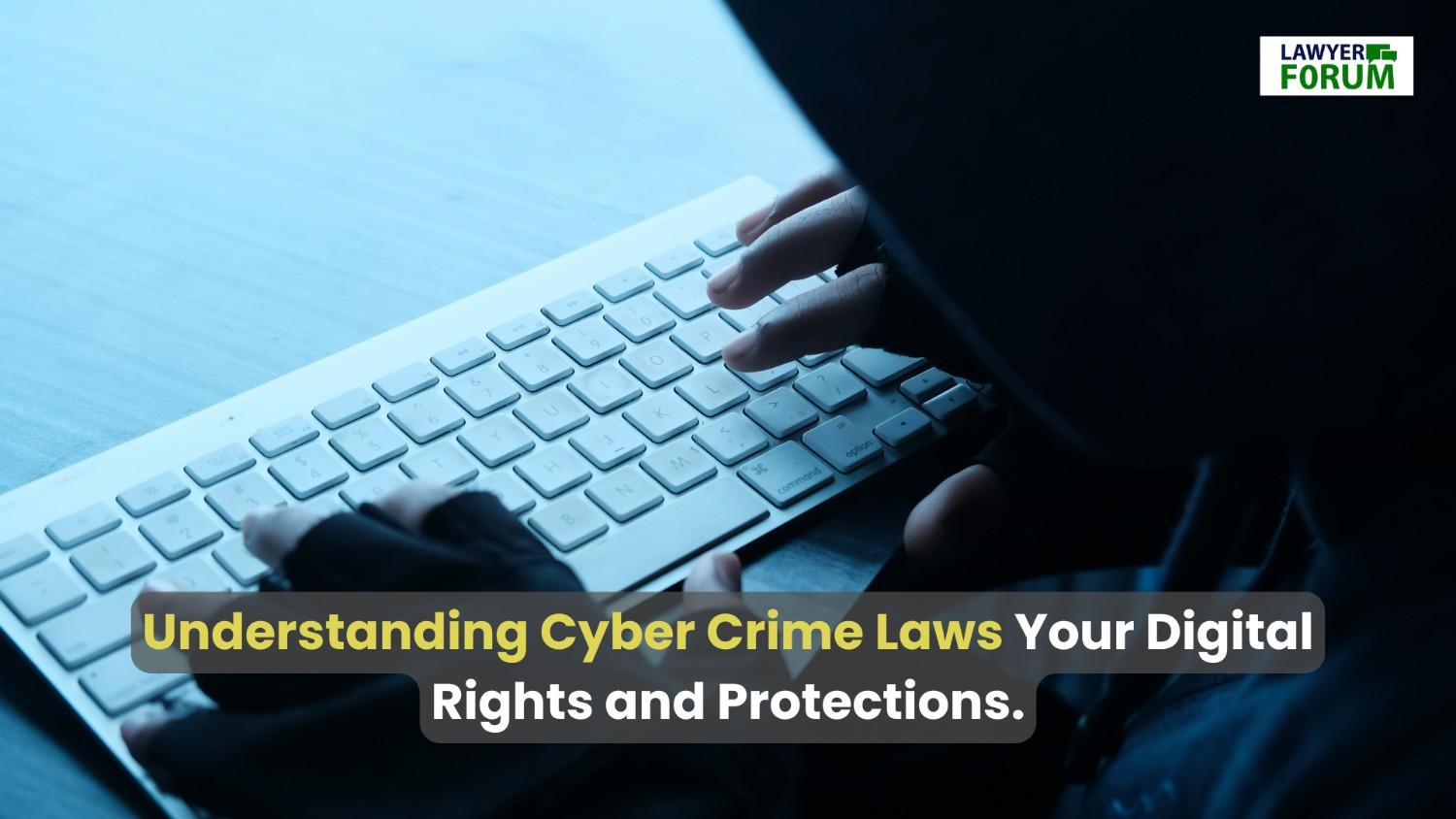· Cyber Crime Laws · 5 min read
Understanding Cyber Crime Laws: Your Digital Rights and Protections
Cyber crime laws are essential for safeguarding personal information, businesses, and national security in today’s digital world. This article covers the basics of cyber crime, common offenses, and how these laws protect you from online threats.

In today’s digitally connected world, understanding cyber crime laws has never been more important. From protecting your personal information to safeguarding national security, these laws aim to secure every aspect of our online lives. But what exactly do these laws cover, and how do they protect you? Let’s explore the essentials of cyber crime laws, your digital rights, and what protections exist to keep you safe.
What is Cyber Crime?
Cyber crime refers to illegal activities conducted via the internet or digital means. These crimes range from hacking and fraud to identity theft and cyberbullying, impacting individuals, organizations, and even governments.
Common Types of Cyber Crimes
Some of the most prevalent cyber crimes include:
Hacking and Unauthorized Access – Gaining illegal access to networks and systems.
Identity Theft – Stealing personal information for fraudulent use.
Phishing and Fraud – Scamming individuals to obtain sensitive information.
Cyberbullying – Harassing or targeting individuals through online channels.
History and Evolution of Cyber Crime Laws
Early Cyber Crime Legislation
The initial attempts to curb cyber crime emerged in the 1980s when computers became more accessible. Early laws aimed at addressing hacking and digital theft laid the groundwork for the comprehensive cyber laws we see today.
Significant Developments in Digital Laws
As technology evolved, so did cyber crime. Laws were expanded to cover a broader spectrum of offenses, including data breaches and online harassment, reflecting the complex digital landscape.
Why Cyber Crime Laws are Essential
Cyber crime laws play a crucial role in:
Protecting Personal Data – Safeguarding individuals from identity theft and privacy violations.
Safeguarding Businesses – Ensuring that companies are protected from data breaches and financial fraud.
Preserving National Security – Defending against cyber terrorism and protecting critical infrastructure.
Global Cyber Crime Laws Overview
International Standards and Agreements
International frameworks, such as the Budapest Convention, have been established to foster collaboration in cyber crime prevention, enabling countries to work together in addressing cross-border issues.
Key Countries and Their Cyber Crime Laws
While each country tailors its cyber laws to specific needs, they all share a common goal: to protect citizens and businesses from digital threats.
Cyber Crime Laws in the United States
Federal vs. State Cyber Laws
In the U.S., both federal and state governments enact cyber crime laws. While federal laws provide a broad framework, states often implement additional regulations to address local challenges.
Key U.S. Cyber Laws and Acts
Some prominent U.S. cyber crime laws include:
CFAA (Computer Fraud and Abuse Act) – Focuses on unauthorized computer access.
HIPAA (Health Insurance Portability and Accountability Act) – Protects sensitive health data.
COPPA (Children’s Online Privacy Protection Act) – Safeguards children’s personal information online.
Cyber Crime Laws in Europe
GDPR and its Impact on Cyber Security
The General Data Protection Regulation (GDPR) is a landmark law that provides stringent guidelines on data protection and privacy, influencing cyber laws worldwide.
Country-Specific Cyber Crime Legislation
Countries like Germany, France, and the U.K. have their own cyber crime laws that complement GDPR, addressing unique local concerns.
Cyber Crime Laws in Asia
Notable Cyber Laws in China, India, and Japan
Asian countries are developing robust cyber laws to combat online crime:
China – Implements strict data control laws to protect national security.
India – Enforces the Information Technology Act to tackle cyber threats.
Japan – Focuses on data protection and cybersecurity in financial services.
Regional Cooperation in Cyber Crime Prevention
Asian countries are increasingly cooperating to fight cyber crime through regional organizations, enhancing security protocols across borders.
Cyber Crime Laws in the Middle East and Africa
Developing Frameworks and Emerging Cyber Crime Laws
Many Middle Eastern and African nations are establishing frameworks to protect citizens and combat emerging threats, acknowledging the growing risks associated with digitalization.
Unique Regional Challenges
These regions face distinct challenges, such as limited cyber crime enforcement resources and growing cyber dependency.
Common Digital Rights Under Cyber Laws
Privacy Rights
Privacy rights are a cornerstone of cyber crime laws, ensuring that individuals control their personal data.
Right to Data Security
Cyber laws mandate organizations to protect users’ data, holding them accountable for breaches and leaks.
Freedom of Speech and its Limitations Online
While freedom of speech is protected, there are limits on harmful or illegal online content, balancing personal freedom with public safety.
How Cyber Crime Laws Protect You Online
Identity Theft Protection
Cyber laws provide safeguards to prevent and penalize identity theft, offering recourse if your information is misused.
Financial Fraud Safeguards
Strict regulations exist to protect users from online scams and fraud, particularly in e-commerce and banking sectors.
Cyberbullying and Harassment Laws
Cyber laws address online harassment, providing legal tools for victims of cyberbullying and harassment.
Challenges in Enforcing Cyber Crime Laws
Cross-Border Jurisdiction Issues
Cyber crime often crosses borders, complicating enforcement due to jurisdictional limitations and legal discrepancies.
Rapidly Evolving Technology and Legal Gaps
The fast-paced tech landscape often outpaces legislation, leading to gaps that cyber criminals exploit.
Your Role in Cyber Security
Personal Responsibility in Staying Safe Online
Understanding basic cyber security practices can reduce your risk of falling victim to cyber crime. Staying vigilant online is key to personal protection.
Reporting Cyber Crimes and Recognizing Threats
Knowing how to recognize and report cyber crimes helps law enforcement take action and prevents future incidents.
Future of Cyber Crime Laws
Potential Reforms and Emerging Legislation
Governments continue to update cyber laws, focusing on new areas like artificial intelligence, to address modern cyber threats.
Role of Artificial Intelligence and Technology in Cyber Law
AI and machine learning are transforming cyber law enforcement, allowing quicker identification of threats and more precise legal responses.
Conclusion
Cyber crime laws are vital in the fight against online crime. By understanding these laws, you can better protect yourself and contribute to a safer digital world. Staying informed and vigilant ensures that you leverage the legal protections available while safeguarding your digital presence.
Frequently Asked Questions
What is cyber crime, and how does it affect individuals?
Cyber crime involves illegal activities conducted online, affecting individuals through identity theft, financial fraud, and data breaches.How can I protect myself from cyber crime?
Basic security practices, like using strong passwords and recognizing phishing attempts, help prevent cyber attacks.What should I do if I’m a victim of cyber crime?
Report the incident to local authorities or cyber crime reporting agencies and take steps to secure your accounts.Why do cyber laws differ by country?
Each country tailors cyber laws to address unique local challenges, although many collaborate on international standards.



